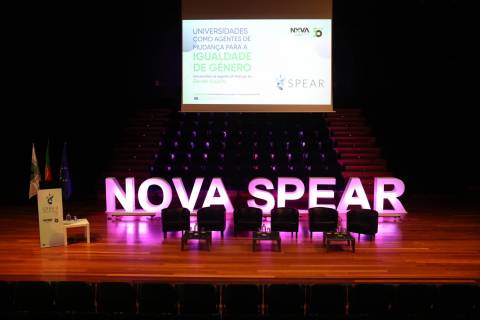
If universities have a "fundamental role" in the creation of a "fairer" society, if they are "privileged spaces" to set examples of policies and good practices, then they "can and should" be promoters of gender equality - both in teaching and in research and innovation, "absolutely fundamental" to change the world. If NOVA's mission is "to serve society through knowledge" then it is fundamental that it is an "agent of change", producing institutional changes. "From equal opportunities" to "conciliation of personal and professional life".
These were the words spoken by the Rector of NOVA, João Ságua, in the opening of the conference "Universities as agents of change for gender equality", which took place this Wednesday, the 15th, in the auditorium of the rectory of NOVA, in Lisbon, in the scope of the project SPEAR - Supporting and Implementing Plans for Gender Equality in Academia and Research.
After highlighting a "great satisfaction" for the University NOVA of Lisbon to be the discussion stage "of the fundamental aspects in the implementation of gender equality plans in Higher Education institutions" and recalling that NOVA had already approved, in 2021, its Gender Equality Plan, he announced that "the Office of Gender Equality and Inclusion is also under preparation here at the Rectory", one of the objectives set out in that Plan.
It will be, as the Rector of NOVA also stated, an office that will work "in articulation with our Organic Units" and will have as responsibilities, among others, "the monitoring of NOVA performance in terms of gender equality, in several areas; the promotion of training and awareness initiatives aimed at the NOVA Community; and the recommendation of good practices to the management bodies".
The event was also attended by the Minister of State and Parliamentary Affairs, Ana Catarina Mendes, who immediately congratulated NOVA for the announcement, highlighting that this is also "the commitment of a university", which seeks to "promote a more just and egalitarian society"; and also Sandra Ribeiro, president of the Commission for Citizenship and Gender Equality, who pointed out that this is "a goal in which the IGC sees itself" in the construction of "a fairer Portugal".
The meeting was also highlighted by the sharing of experiences on the subject in various higher education institutions in the country, in a round table with the participation of Professors Anália Torres and Lucinda Fonseca (University of Lisbon, Mónica Lopes (University of Coimbra), Sandra Soares (University of Beira Interior and Teresa Carvalho (University of Aveiro).
There was also time to:
hear the students' perspective, through the voice of Raquel Lopes, from NOVA Pride Association ("it is a fight for basic rights and for the elimination of discrimination");
to know about the good practices at NOVA FCSH, (where, according to its vice-dean Ana Santos Pinto, echoed by Olga Cunha, coordinator of the Services of Psychology, Inclusion and Equality"there is a strong conviction that this cannot be a narrative, but a modality that must be practised every day")
and to know the experience of NOVA at the level of the alliance of universities EUTOPIA - with Frederico Cavazzini, advisor to the Rector, reminding that it signed, last November, a Manifesto for Inclusion, in which it committed itself to develop 5 fundamental practices to change the current panorama (1. Co-create the structures, practices and institutional culture of the Alliance with all its Academic and Non-Academic Communities; 2. Develop policies and practices to train its community to promote inclusion, respect and dignity; 3. Create inclusive learning, working and research environments; 4. Identify and overcome barriers to inclusion in terms of access, participation and representation; 5. Develop governance mechanisms to monitor and report on the implementation of these practices").
If, as Frederico Cavazzini also underlined, "change takes time, but it is a path that is made faster if we do it collectively", then, in the year in which NOVA celebrates its 50th anniversary "it is particularly symbolic that this theme gains a strategic dimension and an urgent character for the University", he said.
Closing the session, Vice-Rector Isabel L. Nunes, NOVA's vice-rector in charge of this area, summarized: 1. Achieving Gender Equality and Inclusion is still a challenge, which requires the awareness and mobilization of the whole society;
2. To face this challenge, it is necessary to continue to fight for effective equality of opportunities and treatment, to eliminate any form of discrimination based on gender and to create the conditions that allow for the conciliation of personal and professional life, for the success and well-being of all; and
3. Finally, Universities are in a privileged position to contribute to the pursuit of this challenge".
But not only. Pointing out NOVA's commitment, since its foundation in 1973, to building fairer and more prosperous societies, Isabel L. Nunes also recalled that "we must all be aware that the commitment assumed is a collective responsibility, whose success depends on the actions of each element of the NOVA community". Or as she so aptly recalled, "the project is at an end, but our work is not".
It was in 2019 that NOVA joined the European consortium SPEAR, funded by the EU framework programme Horizon 2020, under the theme "gender equality". Coordinated by the University of Southern Denmark together with eight European universities, SPEAR sought to develop institutional changes in order to increase women's participation in Research and Innovation, and to improve their career prospects.
See here also how was the final conference of the project in Denmark .